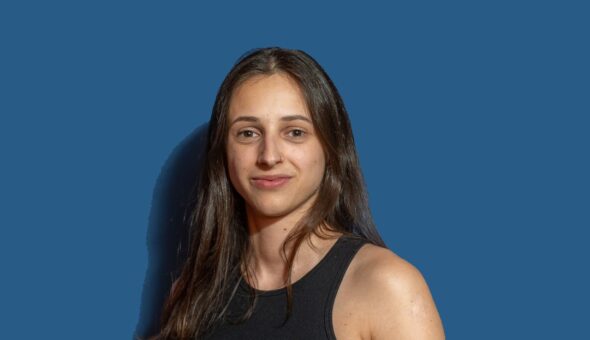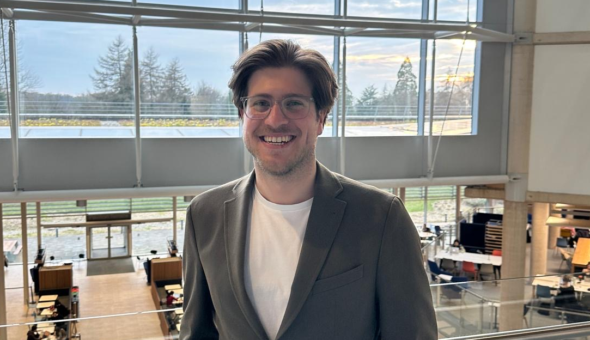Recent graduate Dr Oyinkansola Ige reflects on her time as a PhD student at the University of Bath's School of Management, explaining how volunteering came to be a central part of her doctoral experience and sharing her tips for getting through a PhD. Oyin was recently selected as a Bayes Fellow at the Faculty of Management in Bayes Business School.
What is your PhD about?
Doing a PhD with University of Bath has been one of the most fulfilling experiences of my life. I started my PhD in September 2017 - wide-eyed and inquisitive about what the nuances of the journey held for me. I had intentions of delving into the theory of cultural representation and sustainable production. However, my supervisors introduced me to a wide range of management literature, and through perusing these materials, I found more interesting areas to look at - one of which was ‘CSR Authenticity’. My PhD offers a novel perspective on Corporate Social Responsibility (CSR) by focusing on the theoretical lens of existential authenticity. It unravels overlooked elements of CSR theory and practice, which have huge potential for influencing future scholarship in the field. I look forward to sharing my ideas with the world through peer-reviewed academic articles, which are currently in the works.
Why did you decide to do a PhD?
I had different motivations for doing a PhD. I noticed how excited I got whenever I interacted with a well-written academic paper. Some part of the journey seemed ‘serendipitous’, as along my life’s journey I always came across opportunities to carry out academic research and I found myself growing to love it. The topic of CSR authenticity was of interest to me because I have a background in communications, and I’ve always been curious about how the media influences the decisions of individuals. In this case, authenticity has some overlaps with communication, and so it was something that really resonated with me. I hope that my PhD will help CSR practitioners to better appreciate the value of stakeholders’ experiences while participating in CSR activities.
What have you found challenging about doing a PhD?
I found it difficult to network at the start of the PhD - as much as I wanted to engage, I usually found myself tongue tied, especially around researchers that I really wanted to work with. I thought I would be seen as ‘too forward’- wish I now see as ‘imposter syndrome’! I also struggled with a range of emotional rollercoasters in my third year, which was really distracting at the time.
How did you overcome these challenges?
I leaned on my church community, which helped to keep me grounded in my faith. I had close-knit friends within my department, and my friendship with them created a safe space to be open about my struggles and combining them with the PhD. I was also in touch with my family, back in Nigeria, which gave me the emotional succour I needed at the time. My supervisors were also very supportive.
What was the most rewarding aspect of doing a PhD?
I enjoyed volunteering a lot. Volunteering helped - or rather, forced me to overcome shyness and imposter syndrome. As far back as I can remember, I have always wanted to live a life of positive impact. On getting into the doctoral program of the University of Bath, I resolved to contribute to the growth of the doctoral community. One of the ways I contributed was by becoming an Academic Representative, which exposed me to the negotiations that go on behind the scenes concerning the welfare of doctoral students. Through this I became more empathetic towards my fellow doctoral colleagues, who aimed to build a career within and outside of academia. I found myself constantly looking for opportunities to improve the doctoral experience for myself and others. This led me to mirror the voices of my colleagues during SSLC meetings.
Second, I took on the role of a Doctoral Engagement Ambassador. I led lots of induction sessions for incoming doctoral students. I became more involved with the doctoral community through ‘Slice of Research’- where I was led sessions with doctoral students to help them with presenting their research work. Alongside this, I took on the role of a Peer Mentor, where I was required to reach out to doctoral students and keep them engaged and support, especially during the COVID-19 pandemic. All of these experiences showed me the need for informal reading groups and study groups, which I then founded – I believe these enhanced the personal well-being of all doctoral students involved.
Third, I began leading academic workshops for postgraduate students looking at research methodology. I volunteered to be a student trainer – giving my time to deliver peer-led workshops to undergraduate students within the University. I volunteered tirelessly within different University projects including One Young World and the NCRM Qualitative Research Workshops. These various roles allowed me to empathize and interact with fellow students –improving the doctoral experience for myself and others. With regards to my professional and research development, it enabled me to develop the knowledge, skill, and personal qualities required to do research and to work with others, ultimately enhancing engagement, influence, and impact. Based on my excellence on these roles, I also won an award in both the Doctoral College awards and Student Union Engagement awards.
What is your goal for the future and how has your PhD prepared you up for this?
In the next five years, I hope to have established myself as a prolific researcher with diverse outputs in subject areas such as Organizational Behaviour, Marketing and Consumer Research, and Corporate Social Responsibility (micro-CSR). I want to inspire students through teaching and interacting with them. The main experiences of my PhD have been helping others, (especially through teaching opportunities); learning to network (for example, attending academic conferences like International Association of Business and Society Conference in San Diego and the CSR Communications Conference in Sweden); developing skills around seminar writing and retreats (through writing courses organized by University of Bath and the Doctoral College). These experiences have in no small way, enriched my skillset, and have helped me on the job market.
Do you have any tips for anyone considering a PhD?
For anyone considering a PhD with the University of Bath School of Management, here’s what I would recommend:
- Network, network, and network. Most times, the opportunities that will take you to the next level of your career can be found through the people you meet and the places you go.
- Establish a friendly rapport with your supervisors. My journey was beautiful because I had amazing supervisors who were very invested in my growth and my productivity.
- Volunteer as much as time allows. Volunteering opens so many doors, and you can pick up many skills. However, ensure that whatever volunteering roles you take on are in line with your career goals and personal development.
- Make sure you’re doing a PhD because it means something to you! You will encounter many difficulties across the way so you must build up intrinsic motivation and internal resilience that will help you keep going even when you feel like your world is stopping.
- Take advantage of opportunities – apply for grants, apply for fee waivers, get involved with writing papers. Get your hands on all opportunities that may help grow your skillset and refine your career niche.
- The PhD is not your whole life, so use the journey to develop other interests outside of the academia - sports, music, drawing and so on. I was a chorister in my church throughout my doctoral years and it was such an enriching experience for me and gave me something else to focus on outside of work!
- Keep in touch with family and close friends or build a network of quality relationships. The PhD has tendencies to be isolating sometimes (based on the nature of activities involved), so you must make conscious efforts to reach out and keep in touch with people (outside of your academic community).
To wrap up, I must say I had the best of times at the School of Management. I did my PhD with the School’s Centre for Business, Organisations and Society and through this group, I found wings to fly. I understood my academic identity better and found a home for my research ideas. My supervisors and examiners were incredibly helpful and always gave constructive feedback. Between the reading groups, paper development workshops and guest lectures on offer, I felt supported and inspired. My PhD colleagues were always willing to help, and the environment was a growth-enhancing one. I will always be grateful for the opportunity I had to do my PhD here.
Respond



